Article by Dato’ Steven Wong which appeared in New Straits Times, 6 March, 2018
WE live in interesting, if surreal, times. United States President Donald Trump recently stated that trade wars are good and easy to win, making some of us wonder whether we have somehow warped into a parallel universe.
It is hard to imagine wars of any kind being good or easy to win, but, if they are, why have we been so irresponsible as to have so few?
Granted, we have learned not to take him literally.
But, ordinary people on the street, playing out their personal dramas, cannot be expected to understand the complexities of trade and commerce.
And the issues can be complex. But, surely the “most powerful man on the planet” would fully understand the implications before making such a statement.
Not so, it seems.
In the first place, the global imposition of 25 per cent tariffs on steel and 10 per cent on aluminium on the grounds of national security — note this term — does not constitute a trade war.
It does inch the world towards one, however, if cooler and smarter heads do not prevail, this tit-for-tat retaliation and escalation will lead to a full-blown war.
US duties on steel, iron and a whole host of other items were already imposed by the previous Obama administration on the grounds of unfair trade.
Many cases were filed at the World Trade Organisation (WTO) and won.
One of Barack Obama’s last executive orders was even to make it more difficult for exporters to circumvent the anti-dumping and countervailing tariffs imposed when injury was suspected.
Yet, Obama did not glorify these actions as acts of war.
Instead, he upheld international trading rules and institutions while seeking relief for American workers.
And, he pursued trade liberalisation bilaterally and regionally.
His signature, the Trans Pacific Partnership (TTP), was concluded largely on the strength of US leadership, but it now remains to be enjoyed by only the remaining 11 countries.
The essential difference is this: Obama’s actions were based on unfair trade and injury, whereas Trump’s actions are based on national interest where these do not need to be established.
If other countries do the same, we cannot only kiss the global trading rules and WTO goodbye, but a big chunk of our industry and prosperity as well.
Second, it has all been done before.
Trump and Obama are hardly the first presidents to act on steel products.
Others have, in some form or other, gone back to the 1960s.
The last time an American president sought to protect the steel lobby in similar wholesale fashion was in 2002 when George Bush Jr levied duties of up to 30 per cent on imported steel, only to dismantle them 20 months later.
It is perfectly legitimate to want to preserve a nation’s steel-making capacity.
But, as most economists know, the benefits of protection go to the producers, while American consumers ultimately bear the cost.
Exporters will also suffer but after their madcap build-up of steel capacity in previous decades, there is no way out but for them to rationalise.
US Secretary of Commerce Wilbur Ross, a billionaire who reportedly made part of his fortune by investing in failing steel companies, held up a can of soup on television to demonstrate the tiny effects aluminium tariffs would have on raising costs. Could he have argued the same by holding up a Tesla Model S or a Westinghouse washing machine?
Third, in times of automation technology, it is arguable that even steep tariffs on steel and aluminium will have much long-term effect.
The story of steel, aluminium and just about every manufactured product was, is and always will be, about innovation and productivity.
High tariffs, however, shield American producers from taking the necessary actions to make such bold new investments.
For the record, while it is a part of economic folklore that the Smoot-Hawley Act of 1929 was responsible for the Great Depression, this runs counter to the facts and the evidence.
While the act may have exacerbated the Great Depression and/or delayed recovery, it almost certainly did not cause it.
By the way, both gentlemen subsequently lost their seats.
Despite many skirmishes and near-misses, the global trading system has somehow remained functional.
Trump’s trade war may be nothing more than hollow machismo and posturing. But, dangers lurk, and a few seemingly inconsequential but ill-timed matters can upend one of the most important platforms for global peace and prosperity in the last 70 years.
Dato’ Steven Wong is deputy chief executive of the Institute of Strategic and International Studies Malaysia





